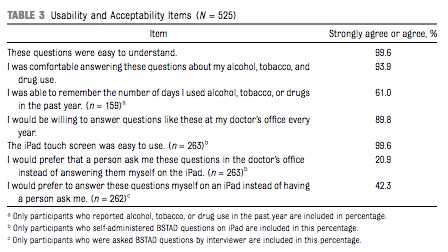 According to a non-randomized trial of 524 mostly African American teenagers, screenings administered via iPad could help pediatricians to learn about their patients' drug, alcohol, and tobacco use more reliably.
According to a non-randomized trial of 524 mostly African American teenagers, screenings administered via iPad could help pediatricians to learn about their patients' drug, alcohol, and tobacco use more reliably.
The study, recently published in Pediatrics and conducted in Baltimore, Maryland, tested a new brief screening tool from the National Institute on Alcohol Abuse and Alcoholism -- one which had not previously been clinically validated. Half of the participants were given the screening on an iPad, while the other half was asked the same questions out loud by an interviewer. They were then asked additional questions about the screening process itself.
Overall, the iPad was the preferred method of testing: 42.3 percent of participants who were interviewed said they would have preferred to answer questions themselves on an iPad. Only 20 percent of iPad users said they would rather have been interviewed. Additionally, 99.6 percent of iPad users said they found the touch screen easy to use.
"Brief screening tools that offer the flexibility of patient or provider administration provide flexibility in pediatric practices and permit patient choice," lead author Dr. Sharon Kelly wrote in the paper. "In the current study, self-administration of the BSTAD on an iPad was feasible and well received by participants. Self-administration would benefit a busy pediatric practice because data could potentially be entered directly into the electronic medical record and immediately reviewed by the provider. Another potential advantage of self-administration is that there is some evidence that this approach yields more accurate and reliable responses from adolescents compared with administration by an interviewer for sensitive topics."
Other responses did not vary between the two screening modalities, however -- iPad users were no more or less willing to participate in the screening at their doctor visits, and there's no data that they were more or less honest or forthcoming about drug or alcohol use. In terms of the actual amount of drug use found, the numbers lined up with existing numbers on national African American teen drug use, suggesting a reasonable level of accuracy.
Screening teenagers for drug and alcohol use confidentially at their primary care visit could provide an opportunity for early intervention. But according to the study, there isn't an existing, accepted screening test for adolescent drug and alcohol use that is both succinct enough and specific enough to be practical, and many pediatric practices don't offer a screening.













